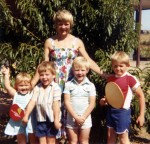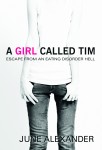When mother has an eating disorder
When mother has an eating disorder
I reached for the phone. I was ready to accept the guidance of my minister and psychiatrist so I could become a person with normal behavioural habits. ‘I will go to the mental health hospital this Sunday,’ I vowed. ‘If I don’t go I will defer my recovery. I want to be free.’ But on Sunday morning I cancelled my admission. My children announced they were bringing friends around for tea and I wanted to be at home for them.
Recovery from an eating disorder is hard enough when surrounded by a loving, understanding family backed by a collaborative treatment team. It is harder still when you are an adult – without family support, trying to live a part life that involves responsibilities, such financial independence and caring for children. It is easy to put recovery on the back burner. I did so, for decades. A part life is exactly that – “ED” pulls the strings, dominates every hour of every day. You try to function on whatever tiny bit of self you retain – I managed to hold on to my job as a newspaper journalist and this, together with journaling, was a lifeline. But “ED” ensured life was chaotic and traumatic, sabotaging motherhood. If you are living a part life I encourage you to persist in seeking a full life; make freedom from your eating disorder a number one priority. Don’t delay. The rewards will be great. In this blog and subsequent blogs, I share insights from my journals. I hope they help you understand your situation and inspire you to soar. The ramblings are drawn from my diaries when I was aged 35 to 40:
Christmas was spent at my parent’s property with my children. This was a thousand times better than being separated from them, as I had been in recent festive seasons. However, on Boxing Day (December 26), my sister and my mother arranged for my children to go out that night with others, without conferring with me. Fighting ED, which was telling me I was unworthy to care for my children, I tearfully confronted them: “Don’t I have any rights as a mother?” I ran from the kitchen and headed for the hills, thinking my family acted as though I didn’t exist, rejecting me even when I was present.
I hardly knew who I was – my tormentor, ED, had been wreaking havoc on my thoughts and behaviour since I was 11. I was fighting this thing inside me
unto its death; fighting to set myself free to enjoy life, to give, to grow; this, this was the transition of me. This is what I was doing; 28 years was enough.
ED convinced me not to see my psychologist any more. She had been trying to strengthen my weak positive voice, encouraging me to be myself. ‘She’s a waste of money,’ ED said. ‘You can manage yourself.’ So I worked out my own methods. I’d walk for at least an hour daily and count calories. Just to get through each day knowing I had not let myself down would be a reason for feeling at peace.
My strategy was quickly tested. My daughter arrived, announcing my parents were at her dad’s house, two kilometres away. They were “having a rushed trip” from the country. Oh, my head ached. Yet again they had called on my ‘ex’ and not me. What could I do to numb my pain? ‘Don’t binge,’ my positive voice pleaded. ‘Resolve to live your own life, and not feel guilty about it.’ I was in my kitchen when my daughter arrived, about to cut up a half-thawed chicken for a casserole. When she departed, salty tears of anguish fell on the naked bird as I pulled it apart, ripping its flesh into many pieces.
A day passed before I summoned courage to phone and tell my mother I felt unhappy and hurt because she did not visit me. “I seem to be a low priority with you,” I said. The following Sunday was Mother’s Day and rather than visit her, I stayed home to have a meal with my children. I thought: ‘I’m not ready to cope with this rejection stuff, which hits at my core and confuses me.’
At the same time, I read many books on faith and the meaning of life. I could see food was a failure as a control mechanism. If I stopped dieting, my bingeing would cease, but I’d have to confront my tormentor. For the first time the enormity of my struggle hit me. My family’s love and support was crucial but I didn’t have it. I didn’t know if the man in my life was strong enough to take my family’s place in meeting my inner needs – I’d need huge doses of emotional support to do what I had to do, to be normal.
My newspaper work helped me feel sane. Colleagues treated me with respect and, sometimes, I felt normal but my partner wanted me to resign from work, stay home and write. “You’re too scared to do so,” he said, but my psych said: “You will go from the frying pan into the fire if you stop work.” I had to believe my psych. On who else could I rely when I did not know my own mind? While office politics could be stressful, I didn’t need money worries on top of everything else.
Regression occurred when I felt rejected and worthless, particularly in relation to family matters. My son returned home from my ex’s house one evening and announced that my ex and his new woman had stayed a weekend at my parents’ home. I felt angry, and hurt. Perhaps they thought I had no feelings. Perhaps they didn’t care. The new woman had taken my place. I wanted to scream: “I’ve extra-sensitive feelings, and I feel REJECTED!” I saw my psychiatrist the next day. Unable to fathom my family’s behaviour, he agreed it was hurtful. I was losing myself entirely. The psychiatrist prescribed medication, which he said would help suppress the urge to stuff myself, and to see him in three weeks.
As for my four children, I was happiest when they were with me (two lived with their father). They were all teenagers by now. We had established a Sunday evening meal tradition at my house. For two hours my children visited, often with a friend or cousin or two, and chatted, joked and laughed around my dinner table. Two hours a week with all four children – this was bliss.
I hoped to return to the country to live but for now, I needed to work on the newspaper to build up my assets. In the evenings, I relaxed by working on tapestry wall hangings or cushions, or by tapping on my home computer. Writing was my lifeline in trying to make sense of my struggle. One evening, distraught, I was typing a story about what was like having a chronic mental illness and missing my daughter. After four attempts to phone my ex, I connected with him and courageously mentioned I’d like our daughter to live with me. He said she had raised this possibility and his answer was an emphatic “no”. I asked if he was thinking of our daughter’s needs or my needs. “I’m thinking of my needs,” he said, and put the phone down. At 14, our daughter was old enough to live where she chose, with her mother or father, but her father’s influence could easily persuade her to stay with him. When I mustered the courage to ask her, she said: “I prefer to stay with Dad.” Our conversation degenerated until she said: “Why do you care now, Mum? You didn’t care once.”
Too young to understand my illness, all my daughter knew was that I’d left her dad and her when she was nine years’ old. I’d worked since she was two, because doctors said I should, to hang on to my sanity. I had not sought her custody, as I was still in recovery and my greatest fear was that my daughter might develop anorexia nervosa like me. I thought she would have more chance of avoiding the illness if living with her stable and secure dad. My heart sang when she was with me, and cried when she was not.
To be continued.







